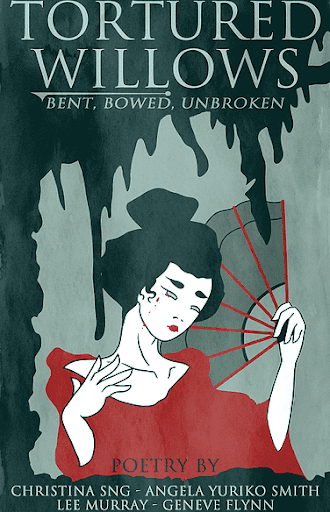 Lee Murray and Geneve Flynn discuss Asian-Western perspectives of being perpetual outsiders, and reveal the cover design for their latest project, Black Cranes: An Asian Women in Horror Anthology
Lee Murray and Geneve Flynn discuss Asian-Western perspectives of being perpetual outsiders, and reveal the cover design for their latest project, Black Cranes: An Asian Women in Horror Anthology
Geneve Flynn: Being an Asian woman in a Western country has its funny moments. Being a horror writer on top of all that is even odder. Once, after I politely declined to discuss the need to save my soul, a religious door-knocker looked me up and down and said, “You probably don’t even believe in God”. Lady, you should see the things I write about.
I think that sums up the experience of living with a cloud of stereotypes and expectations around you. As Asian women, we’re expected to be demure and family-oriented, or highly sexualised objects. We’re submissive, we’re kick-ass martial artists, we’re good daughters, we’re tiger mums. We’re supposed to be doctors or dentists or lawyers. We certainly aren’t supposed to write about gore and freakishness.
Lee Murray: Geneve, don’t get me started. Sometimes I think I’m a walking Asian-girl stereotype. I studied the Asian-Five subjects at school, won the Math Prize, played the violin, and got called Kim or Sue by people who forgot my name. Vertically stunted since the age of nine, I have tiny size five feet, can’t reverse a trailer, find it hard to accept compliments, and I always have a stock of extra toilet rolls in the house. Door-knockers usually mistake me for the cleaner. But we’re also paradoxes, aren’t we? Rejecting tradition and forging new routes. Flouting the Asian tradition of quiet submissiveness, my volume is perennially set to loud. I’m rarely obedient (just ask my husband), and I’ve been known to sweat. And, of course, I write horror.
Geneve Flynn: When we met at GenreCon in Brisbane in 2019, we had so many shared experiences about being Asian, being female, and writing horror. We were the black sheep, the outsiders. It felt great to find someone who knew what it was like. But we both lamented the fact there were so few writers like us. (It turns out, there are Asian women writing horror in English, only they’re not always visible.) Then you turned to me with that wicked gleam in your eye and proposed a collaboration celebrating Asian women of horror. I jumped at the idea of dissecting our shared experience and exploring it through dark fiction.
Lee Murray: It’s always so freeing to discover someone who gets you, who truly identifies with your experience, and for me, finally meeting you at GenreCon was a bit of a lightbulb moment. I suddenly realised I was yearning for that shared connection. I think the same thing occurs when we find ourselves reflected in a story. For example, I remember when the movie version of Mao’s Last Dancer was released 2010, my mother insisted on taking me to see it. About half an hour into the movie, the main character returned to his family home in the remote farming village in China. My mother gripped my arm tightly. “There!” she said, indicating the toddler operating the bellows, fanning the wood fire and keeping it alight. “That was me. That was my job.” Sixty years on, my New Zealand-born Chinese mother had finally found her own experience in that tiny snip of film. It meant so much to her that she went back to see the movie three times in one week. Representation matters. In her foreword to Black Magic Women: Terrifying Tales by Scary Sisters (Mocha Memoirs Press), editor Sumiko Saulson notes the dearth of African Diaspora in fiction. “Where they are present,” she writes, “they are relegated to support of background roles. I believe it is important for the self-esteem of a people to be able to envision ourselves as heroes. That means we should be able to read stories and watch movies where there are heroes who look like we do. We shouldn’t be brainwashed into viewing ourselves as less than central in our lives.” That isn’t to say that portrayals must forcibly be positive. “Embracing both sides of someone’s humanity, the good and the bad, is to allow them to be fully human,” explains Black Magic Women contributor Kenesha Williams. Reading Black Magic Women in 2018 was a revelation for me; the stories in the collection are vibrant, unique, irreverent, with a blackness that Saulson describes as “up front and center”. So, when you and I met at GenreCon, I suddenly thought: where’s the vehicle for Asian women horror writers? Where are our stories? Hence, the wicked gleam.
Geneve Flynn: We’re seeing a lot more diversity and representation nowadays. White male authors and characters have tended to be the norm in speculative fiction, but there’s definitely more awareness and effort to branch out. In Australia, women are leading the charge with horror. There are so many amazing horror writers, such as Kaaron Warren, Deborah Sheldon, Kim Wilkins and Angela Slatter.
Lee Murray: Great list! And there’s good reason for that improved representation of women in horror. Echo Lake author, Letitia Trent explains in her 2014 article on Book Riot: “Women, as well as people of color and others who are culturally marginalized, have stories to tell that can transform and subvert existing horror conventions,” she writes. “Horror has subverted expectations about ‘monstrous’ and ‘normal’ or ‘evil’ and ‘good’ right from the beginning of the genre, and now compelling and diverse dark fiction writers are reaching more readers and expanding definitions of horror.” And yet there is still a yawning gap, with few, if any works devoted to Asian horror stories by women writing in English.
Geneve Flynn: It’s strange because Asian horror has had a surge in popularity with movies such as The Ring and The Grudge. There’s definitely a hunger for it. As we delved into this idea of Asian women of horror, we discovered more and more wonderful writers with our unique view of the world. We just had to bring the gang together. We put a call out to invite various award-winning and emerging authors to contribute, incredible writers like Nadia Bulkin, Grace Chan, Rin Chupeco, Gabriela Lee, Rena Mason, Angela Yuriko Smith, and Christina Sng. And to our delight, they all agreed. And we’re excited to announce that Alma Katsu, author of The Hunger and The Deep, has agreed to come on board to write a foreword to the anthology.
Lee Murray: I think their response shows that our colleagues have been yearning for that same shared connection that we had.
Coming up with the Black Cranes title was tricky though. We wanted something which would reflect the contributors’ shared Eastern Asian and South-Eastern Asian heritage, while also conveying a horror theme, finally settling on black cranes—heavenly birds associated with prosperity, longevity, and wisdom. I pitched the concept to Kate Jonez of Omnium Gatherum, the HWA’s Specialty Press for 2016, and immediately got the go ahead. All we needed was a cover designer. As it turned out, Australian horror author and artist Greg Chapman was travelling through Asia when we approached him. His stunning interpretation was inspired by his recent travels and we’re thrilled with the result.
Black Cranes will be released in late July 2020.



 Please welcome author
Please welcome author 


 Lee Murray and Geneve Flynn discuss Asian-Western perspectives of being perpetual outsiders, and reveal the cover design for their latest project,
Lee Murray and Geneve Flynn discuss Asian-Western perspectives of being perpetual outsiders, and reveal the cover design for their latest project, 






